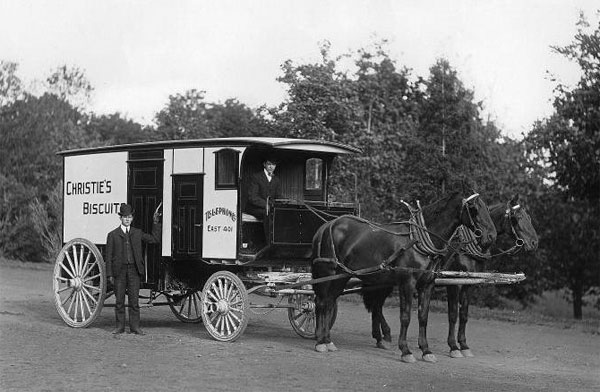Mr. Christie first came to Toronto in 1848. He was still a teenager back then, but he had already spent a few years as an apprentice to a baker back home in Scotland. When he arrived in Canada, he got a job working at a bakery on Yonge near Davisville. He’d spend his nights baking bread and in the mornings he would push a handcart down into the nearby village of Yorkville — still its own municipality back then — to sell his goods.
Things went well. Within a few years, he owned his own company. He partnered with his old boss and started winning awards for his cookies. In 1860, when he just was 30 years old, Mr. Christie already employed a staff of five people baking by hand. From there, the business expanded quickly. By 1874, the steam-powered Christie, Brown and Company factory took up an entire city block. (The building is still there between King and Adelaide a block east of Jarvis; now it’s part of George Brown College.) The business kept right on growing. By the time the 1800s drew to a close, Mr. Christie employed two out of every three people in the entire Canadian biscuit manufacturing industry.
When he died of cancer in June of 1900, William Mellis Christie was one of the most famous businessmen in Canada. He’d built a fortune, travelled around the world, and became a public figure in our city: a trustee of the University of Toronto and a member of the Board of Trade. Christie Street was named in his honour. His mansion stood in one of the highest profile spots in Toronto: across the street from Queen’s Park at the corner of Wellesley. That’s where he passed away. As he was laid to rest in Mount Pleasant Cemetery, his son Robert inherited everything: the money, the business and the Christie Mansion.
That, if you believe the rumours, is when things got weird. The grisly story has been told many times — most notably in the book Haunted Toronto by John Robert Colombo.
Robert Christie, you see, had a mistress. And while he was living in the Christie Mansion with his family, he decided she should live there too. He kept her hidden in a secret chamber behind the wood paneling in the library. They call it Room 29. It was fully furnished, with a bed and a bathroom and a butler to bring her all of her meals so she would never have to leave. She would just hang out in there, waiting for him to visit so they could have sex and carry on whatever twisted semblance of a romantic life you can have when one of you is being held in the secret room of a Victorian mansion by your lunatic cookie baron lover, slowly going mad as he loses interest and you’re left alone more and more often, hour after hour after hour, until you finally can’t take it any more and you hang yourself from the rafters with a bedsheet.
They say Robert had her body secretly removed under the cover of darkness and buried somewhere on the grounds of Queen’s Park. Some claim the guilt drove him to distraction: the business suffered, he was forced to sell the mansion to the university, and soon he followed his father to the grave. Nabisco bought out the company, gave it the famous slogan “Mr. Christie, you make good cookies” and made it home to Oreos, Fudgee-Os and Chips Ahoy!
That, as you might imagine, is why they say the ghost of his mistress still haunts the Christie Mansion. The building became home to the local chapter of the Sisters of St. Joseph’s for a while and now it’s the Jesuits’ Regis College. They say that if you enter Room 29 all by yourself at night, the door will swing shut behind you. You will find it locked; nothing you can do will open it. And if there’s no one on the other side of the door to hear your screams, you’ll be trapped all night, just like Robert Christie’s mistress all those years ago.
A version of this post originally appeared on the The Toronto Dreams Project Historical Ephemera Blog.
Photo: A Christie’s biscuit wagon in 1904, taken by William Notman in Montreal (via Wikimedia Commons)



